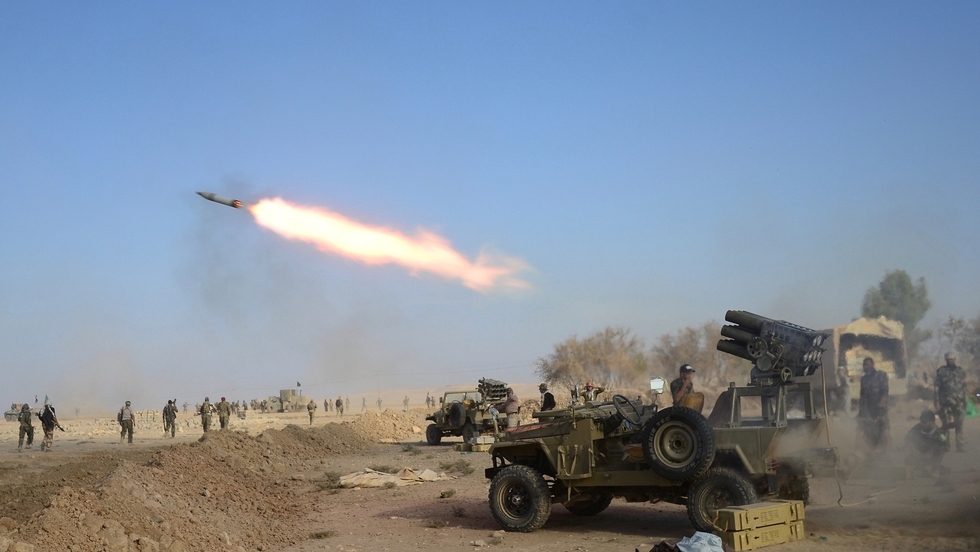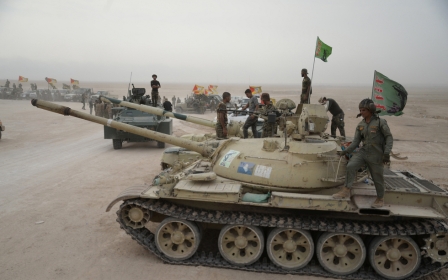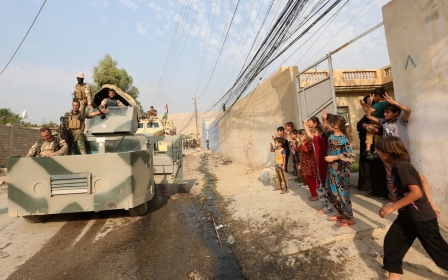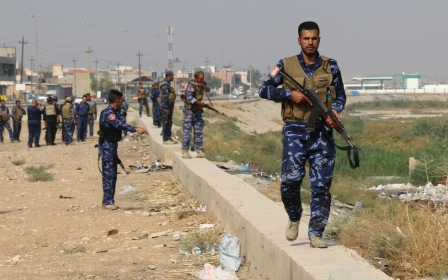Iraq militia say bid to cut IS supply lines to Mosul is gaining ground

Iraqi paramilitary forces said they had captured several villages southwest of Mosul from the Islamic State (IS) group on Sunday, the second day of an operation to cut the militants' supply lines.
Tens of thousands of Iraqi troops and Kurdish Peshmerga fighters have been advancing on Mosul from the north, east and south after the launch on 17 October of a vast offensive to retake IS's last stronghold in the country.
After standing largely on the sidelines in the first days of the assault, forces dominated by Iran-backed Shia militias known as Hashed al-Shaabi or Popular Mobilisation forces, began a push on Saturday towards the west of Mosul.
The ultimate aim is the recapture of Tal Afar, a town west of the city, and the severing of IS supply lines between Mosul and Syria.
The deployment of Shia forces in northern Iraq, an ethnically mixed region where Sunni Muslims form a majority, could inflame sectarian tensions and has led to warnings from neighbouring Turkey.
President Tayyip Erdogan said the town of Tal Afar is Turkmen - inhabited by people with strong cultural and historical links to Turkey - and said Ankara would act if the Hashed forces "unleash terror" there.
Anticipating the offensive on Tal Afar, and highlighting its strategic importance, IS has been reinforcing the town in the last 48 hours, an Iraqi security official said.
He said two waves of reinforcements were sent including rebels who had fought in neighbouring Syria and had experience in using anti-tank missiles.
"Intelligence reports show that the Daesh (IS) groups have entered TOW missiles systems into Tal Afar. It's obvious they are making preparations for a long protracted battle," the official from the provincial military operation command center told Reuters.
His comments could not be independently verified, but a resident of Mosul, speaking to Reuters by phone, said relatives in Tal Afar reported seeing increasing numbers of IS militants in the town, some of them patrolling on motorbikes.
In a series of statements on Sunday, the Hashed's media office announced it had retaken at least four villages southwest of Mosul.
Al-Imraini, one of the recaptured villages, is 45km from Tal Afar, according to the media office.
The involvement of Shia militias in the Mosul operation has been a source of contention, though the Hashed's top commanders insist they do not plan to enter the largely Sunni city.
Iraqi Kurds and Sunni Arab politicians have opposed their involvement, as has Turkey, which has a military presence east of Mosul in spite of repeated demands by Baghdad for the forces to be withdrawn.
Relations between the Hashed and the US-led coalition fighting IS are also tense, but the paramilitaries enjoy widespread support among members of Iraq's Shia majority.
The Hashed has been a key force in Iraq's campaign to retake areas seized by IS in mid-2014, when the militants took control of large parts of Syria and Iraq and declared a cross-border "caliphate".
But the paramilitaries have been repeatedly accused of human rights violations during the course of the war against IS, including summary killings, kidnappings and destruction of property.
Tal Afar was a Shia-majority town of mostly ethnic Turkmen before the Sunni militants of IS overran it in 2014, and its recapture is a main goal of Shia militia forces.
The Sunday fighting came a day after Iraq announced the recapture of al-Shura, an area south of Mosul with a long history as a militant bastion that has been the target of fighting for more than a week.
Iraq's Joint Operations Command announced "the complete liberation of al-Shura," saying that security forces advancing from four different sides had linked up in the area, which is north of Qayyarah base, the main hub for the southern front.
The US-led coalition - which has been assisting federal forces and Kurdish Peshmerga with air strikes, training and advisers for two years - said on Friday that Iraqi forces were observing a pause in the two-week-old offensive.
In Bartalla, a Christian town just east of Mosul, army and counter-terrorism forces were consolidating their positions, unloading cases of weapons from trucks and organising their ammunition stocks.
A handful of faithful gathered in a burnt out church on Sunday for the first mass to be celebrated in two years in Qaraqosh, which was once Iraq's main Christian town.
Iraqi forces retook Qaraqosh from IS just days earlier.
"After two years and three months in exile, I just celebrated the Eucharist in the cathedral of the Immaculate Conception the Islamic State wanted to destroy," Yohanna Petros Mouche, the Syriac Catholic Archbishop of Mosul, said.
"But in my heart it was always there," Mouche, who officiated with four priests, told AFP.
More than 17,600 people have fled their homes toward government-held areas since the Mosul operation began, the International Organisation for Migration said on Sunday.
Numbers are expected to soar as Iraqi forces close in on the city, which is home to more than a million people.
The UN says there have been credible reports of IS carrying out mass executions in the city and seizing tens of thousands of people for use as human shields.
IS's "depraved, cowardly strategy is to attempt to use the presence of civilians to render certain points, areas or military forces immune from military operations," UN High Commissioner for Human Rights Zeid Ra'ad al-Hussein said in a statement.
The militants are "effectively using tens of thousands of women, men and children as human shields," he said.
The UN cited reports indicating IS has forcibly taken civilians into Mosul, killing those who resist or who were previously members of Iraqi security forces.
It said more than 250 people were executed in just two days earlier this week.
Middle East Eye propose une couverture et une analyse indépendantes et incomparables du Moyen-Orient, de l’Afrique du Nord et d’autres régions du monde. Pour en savoir plus sur la reprise de ce contenu et les frais qui s’appliquent, veuillez remplir ce formulaire [en anglais]. Pour en savoir plus sur MEE, cliquez ici [en anglais].




